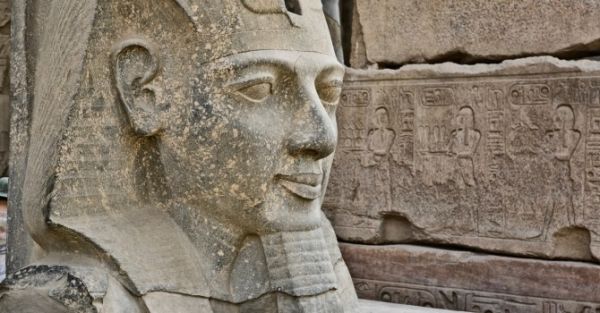Delving into the Lives of Egypt's Pharaohs
The pharaohs of ancient Egypt stand as monumental figures, embodying the essence of a civilization that thrived along the banks of the Nile for thousands of years. As both revered rulers and divine intermediaries, they wielded immeasurable power and influence, shaping the destiny of a nation and leaving behind an enduring legacy that continues to captivate the world. From legendary kings to enigmatic queens, the tapestry of pharaonic history weaves a tale of grandeur, conquests, and cultural brilliance.
Pharaohs of Ancient Egypt: The Ultimate Symbol of Authority
The title of "pharaoh" carried profound significance in ancient Egypt. Pharaohs were considered living gods, bridging the gap between mortals and the divine. They were entrusted with safeguarding the well-being of their subjects and ensuring cosmic order. This divine authority was reflected in their regal attire, monumental tombs, and vast building projects that adorned the landscape.
Ancient Egyptian Kings: Men of Power and Prestige
The male pharaohs reigned with an aura of dominance, presiding over a realm of great complexity. Among them, few are as iconic as Ramses II, renowned for his military conquests and architectural feats. His colossal statues and temples, such as the Abu Simbel complex, remain as testaments to his enduring legacy. Thutmose III, another notable ruler, expanded the empire's borders through strategic military campaigns, solidifying Egypt's influence.
Queens of Ancient Egypt: Women of Power and Grace
In the realm of pharaonic rule, women played a pivotal role as queens and co-rulers. Queen Hatshepsut, one of the most formidable queens, defied gender norms by assuming the throne and ruling with unparalleled wisdom. Her mortuary temple at Deir el-Bahri is an architectural marvel that underscores her influence. Nefertiti, the queen of Akhenaten, left an indelible mark through her artistic representation, symbolizing beauty and grace.
Egyptian Pharaohs' Names: Unveiling the Mystique
The names of pharaohs were laden with symbolism and purpose. These names often held divine references and underscored their authority. Pharaohs would adopt a "Horus Name" upon ascending the throne, signifying their connection to the falcon-headed god Horus. The "Golden Horus Name" celebrated their divine kingship and triumphs.
Tutankhamun: The Boy King's Enigmatic Legacy
Tutankhamun, the boy king of the 18th dynasty, captivated the modern world when his nearly intact tomb was discovered by Howard Carter in 1922. Though his reign was short, his tomb's treasures offered unprecedented insights into ancient Egyptian life and art. The golden mask that covered his mummy remains an iconic artifact that symbolizes the opulence of the pharaonic era.
Ramesses II: The Great Builder and Statesman
Ramesses II, often referred to as Ramesses the Great, etched his name in history through a reign marked by military prowess and monumental constructions. His reign saw the construction of magnificent structures such as the temples of Karnak and Luxor. The Battle of Kadesh, a military engagement with the Hittites, remains one of his most celebrated achievements.
Thutmose III: The Napoleon of Egypt
Thutmose III, often hailed as the "Napoleon of Egypt," left an indelible mark on ancient history through his military genius. His campaigns expanded the Egyptian empire to its greatest territorial extent. The Annals of Thutmose III, inscribed on the walls of the Karnak temple, chronicle his military victories in remarkable detail.
King Khufu: Architect of the Great Pyramid
King Khufu, also known as Cheops, left a towering legacy with the construction of the Great Pyramid at Giza. This monumental structure, one of the Seven Wonders of the Ancient World, stands as a testament to his ambition and engineering prowess. The pyramid complex is a reminder of the pharaoh's quest for eternal life and his devotion to the gods.
Akhenaten: The Revolutionary Pharaoh
Akhenaten, known for his radical religious reforms, sought to shift Egypt's religious focus from the traditional pantheon to the worship of the sun disc Aten. His reign saw the construction of a new capital, Amarna, and a departure from artistic norms. Akhenaten's unique style, characterized by elongated forms, disrupted the artistic conventions of the time.
The pharaohs of ancient Egypt were more than mere rulers; they were embodiments of the divine, architects of monumental structures, and wielders of immense influence. Their names echo through the corridors of time, leaving behind a legacy that continues to inspire awe and admiration. From the grandeur of Ramses II to the enigma of Tutankhamun, each pharaoh contributed to the cultural tapestry that defines ancient Egypt's enduring allure.
Best Egypt Private Tours 2025
| Tour | Itinerary | Price |
|---|---|---|
| Luxor and Aswan Travels | 4 Days | $ 665 |
| Cairo Holiday Packages | 5 Days | $ 819 |
| Cairo to Petra Tour | 7 Days | $ 975 |
| Cairo and Luxor Holidays | 5 Days | $ 975 |
| Egypt and Dubai Tours | 8 Days | $ 1020 |
| Turkey and Egypt Tours | 8 Days | $ 1060 |
| Egypt Overland Tours | 8 Days | $ 1105 |
| Wheelchair Accessible Nile Cruise | 4-5 Days | $ 1145 |
| Cairo and Istanbul Tours | 12 Days | $ 1510 |
| Pyramids and Nile Cruise Holidays | 8 Days | $ 1510 |
